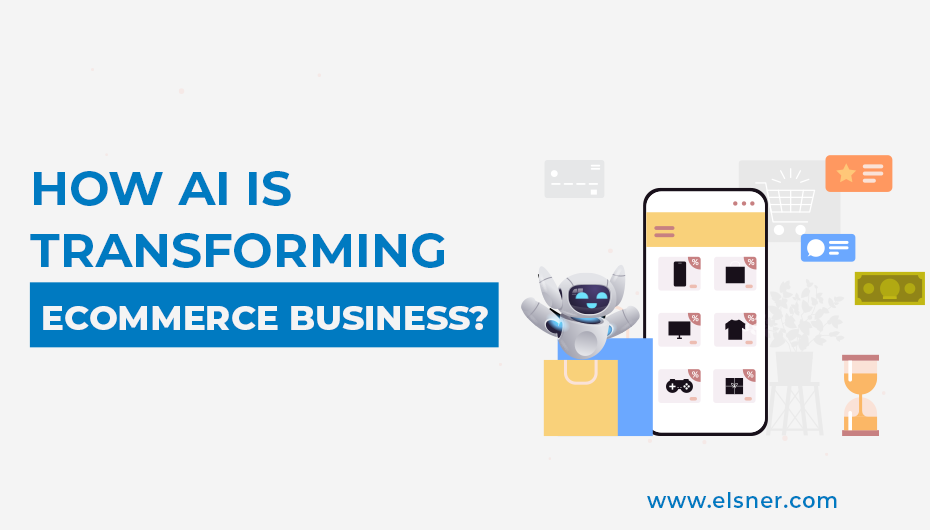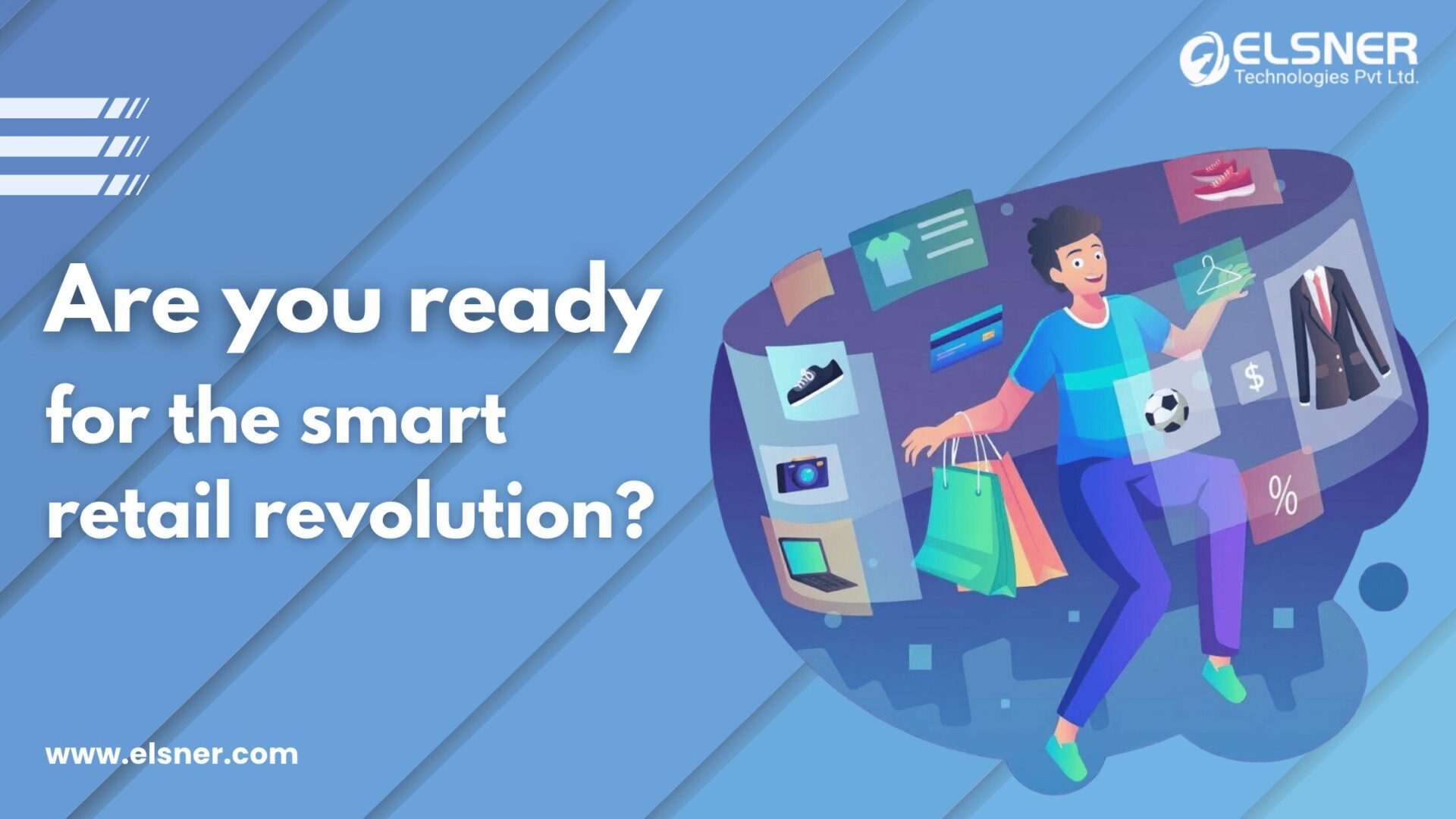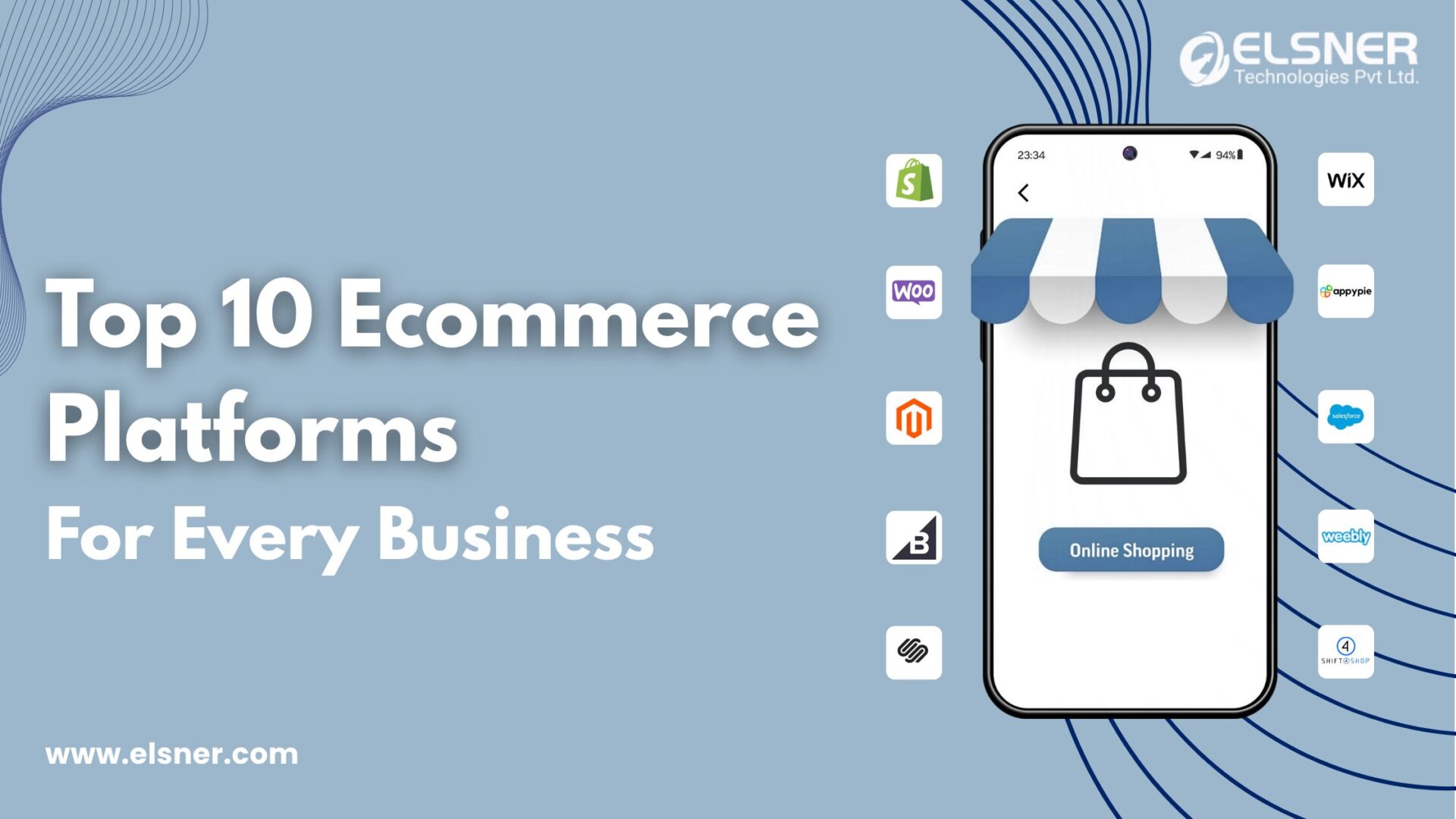- What is AI?
- What are the Challenges in AI ecommerce?
- What is the use of Artificial Intelligence in ecommerce?
- Product Recommendations:
- Advanced Semantics Search:
- Chatting Bots:
- Decision Making:
- Virtual Assistants:
- 5+ Actionable Strategies to use Artificial Intelligence in ecommerce
- 1. Personalize Online Purchases
- 2. Visual Search
- 3. Customer-Centric Experience
- 4. Target Potential Customers
- 5. Efficient Sales Process
- 6. Customize for multiple devices
- 7. Improve Recommendations
- How Artificial Intelligence Benefits the ecommerce Industry?
- 1. Personalized Recommendations
- 2. Semantic-Based Searches
- 3. Smart Decision Making
- 4. Automate Warehouse management
- 5. Chatbots for a personal touch
- 6. Retarget Potential Customers
- 7. Strong marketing strategies
Many believe that Artificial Intelligence adoption has led to the business’s success. With all its amazing benefits, it is also vital to know the challenges of AI in ecommerce. Over the years, technology has transformed business models and increased market standards.
Artificial Intelligence enhances the ecommerce experience by analyzing the data and behavioral patterns.
We know it is a trend, but it also provides great opportunities to make your business powerful with the best solutions.
79% of the people state that integrating AI into sales and marketing has increased their revenue. This number might incline your interest in Artificial Intelligence in the ecommerce industry.
What is the role of AI in the ecommerce industry? What are the challenges of AI in ecommerce? What are the benefits of AI ecommerce? How will AI affect ecommerce industries?
There might be many such queries in your head. This content piece will give you some of the best insights about Artificial Intelligence to paint a clear picture.
Let us begin this journey!
What is AI?
It is a technology that helps beginners to build a software product with learning capabilities and decision-making to boost the efficiency and profitability of the business.
The three main components of Artificial Intelligence are:
- Deep Learning: It is a branch of machine learning and refers to the algorithms in the ecommerce industry. The aim is to discover and track users’ behavior, giving better insights into the business.
- Machine Learning: In the ecommerce industry, it helps uncover data insights without following rigid manual procedures. Like it can help to predict customer behavior and personalize recommendations.
- Natural Language Processing: This branch of machine learning allows machines to understand human speech and patterns. Commonly you can use the NLP in chatbots or voice assistant technology.
What are the Challenges in AI ecommerce?
The biggest challenge for an online store is to have a perfect personalized campaign based on multiple factors like audience, location, interest, and more. Here are some of the challenges that are faced in ecommerce AI:
- Scalability: The size and speed of data generated by online stores are unpredictable, but they expect responses from AI technologies within a reasonable time.
- Human Error: AI technologies are also a godsend in ecommerce but are not immune to errors.
- Cybersecurity: Many malicious programs target ecommerce stores that rely on AI tools and technologies. It is important to have a robust cybersecurity program that handles AI threats.
- Privacy Concerns: With all the sensitive information, ecommerce stores are exposed to security and privacy concerns when they deal with AI-driven systems. The technology eliminates errors and human bias, giving beginners and experts equal importance.
What is the use of Artificial Intelligence in ecommerce?
Product Recommendations:
Business owners are using Big Data to determine customers’ shopping habits. The correct AI system will analyze data that helps personalize the product recommendations. It will access the customer behavior and provide sophisticated predictions about the customer requirements.
During ecommerce marketing, the AI tool will use collaborative filtering that uses the history and general patterns of ecommerce stores. It will curate the recommendations driven by Machine Learning
Advanced Semantics Search:
When we want to get personalized content for ecommerce and customer support, you require intelligent customer engagement. The important part of personalization is the search result. Using the smart semantics search, customers can navigate through the ecommerce store easily and find the products effortlessly.
You might want to consider machine-learning algorithms to understand customer requests. Product search done using artificial Intelligence helps to improve user experience.
Chatting Bots:
Chatbots are the ultimate solution to optimize customer support. Modern technology enables us to engage with the customer database and collect insights to respond in a personalized method. Consumers demand a comfortable experience during their shopping journey. The AI technology makes sure that the chatbots provide personalized and real-time solutions.
Decision Making:
The ecommerce industry has developed skills to handle multiple operations in the business, from deciding the price to management using Artificial Intelligence. Using big data helps users make informed decisions depending on valuable insights through AI tools. Users have the freedom to handle a huge volume of data that is rapidly analyzed to generate actionable insights. “In addition, as you check the Artificial Intelligence SaaS market, you’ll see how this feature plays a huge role.”
Virtual Assistants:
They contribute their talent to increase efficiency while running an ecommerce business. Vas will interact with the customers to understand their perspectives and provide a better experience. Alexa, Siri, and Google Now are some of the best virtual assistant applications in the market. With the help of newer technologies, there is much room for advancements.
Focusing on Cybersecurity:
Ecommerce websites deal with tons of customer information, which means it needs to be secure to trust. AI software is smarter with time as new threats and malware emerge. They will help to block the bots that can steal credentials, cause data frauds, and create fake accounts.
5+ Actionable Strategies to use Artificial Intelligence in ecommerce
1. Personalize Online Purchases
Once you hire ecommerce developers, they will help to personalize and make buying experiences more interactive. Once you enable AI systems, they will let you know customer preferences and provide reliable expertise. They will analyze clicks, purchasing history, search queries, and shopping carts to identify customer behavior.
2. Visual Search
Did you know that 80% of frequent shoppers choose brands that prefer personalized experiences? Artificial Intelligence enables visual search to use an image to look for identical or similar ideas. A picture helps to resolve the issue of inaccurate queries and avoid hitting thousands of words. AI-enables visual search simplifies the process consumers look for products.
3. Customer-Centric Experience
An ecommerce business needs to think like a search engine and humans. Leveraging machine learning helps to automatically manage tags, visually search content, and organize the data. It will give the business a competitive edge to win over the competitors. The right tools will find the matching products be it the size, shape, color, brand, or even fabric.
4. Target Potential Customers
The sales teams do not check over 33% of the marketing leads. This means that many of the potential buyers that are interested in your services fall through the cracks. Many businesses have to deal with unmanageable customer data that might be useful. It will help to anticipate special offers to potential customers using data in Artificial Intelligence.
5. Efficient Sales Process
In the ecommerce industry, you must move ahead from the old sales techniques to reach customers. People are heavily influenced by various media, from social media to websites. Artificial Intelligence helps to tailor problem-solving solutions and build strong sales strategies. The changes ensure that customers will not have to deal with inappropriate products and services.
6. Customize for multiple devices
There is nothing new for ecommerce as the market is continuously evolving, and so are businesses. With increasing advancements in AI and machine learning technologies, you get an opportunity to understand deep levels of personalization. Sitting on multiple customer touch points helps businesses to analyze interactions. It is important to make a presence on mobile applications, emails, or websites and monitor all the channels and devices.
7. Improve Recommendations
Using AI, brands can be more intelligent and efficient in scanning data to predict customer behavior and offer helpful recommendations. The level of Intelligence changes the game while delivering a smooth shopping experience to the customers. Being a dynamic ecommerce industry has revolutionized how people interact with the business.
How Artificial Intelligence Benefits the ecommerce Industry?
Over the years, Artificial Intelligence has transformed business for multiple brands and enterprises to increase market standards. Technology is highly evolving. It helps the users to understand shopping behavior and create a personalized experience.
1. Personalized Recommendations
Machine learning is a type of Artificial Intelligence that enables the app to predict data and algorithms. In the ecommerce business, this is used to identify the actions and interests of the customers depending on their search history.After configuring, the ML will analyze the shopping behavior to personalize the users’ shopping experience. This means you can use Artificial Intelligence to tailor the product recommendations, promotions, and pairings for individual customers. This will enhance the knowledge and significantly increase the sales of the business.
2. Semantic-Based Searches
When you want to customize the customer support in your ecommerce industry, there is nothing better than intelligent customer engagement. Search results play a huge role in personalization, enabling users to navigate the store and get relevant products without distractions.
Artificial Intelligence will carry algorithms to decipher the requests of customers. Many innovations in the market help people conduct searches and discover products that match their search queries perfectly.
3. Smart Decision Making
AI is directly integrated with different aspects of ecommerce operations, from management to pricing. Using Big Data helps retailers make informed decisions that depend on valuable insights. Pricing products is not just a guess as it is challenging to consider all the relevant factors of the competitors.
When you deal with an ecommerce SEO agency, they will provide optimal pricing for businesses to succeed in the competitive world with efficient inventory management. This is achieved by analyzing a huge volume of data and rapidly gathering actionable insights to make the right decisions for your business.
Once the correct data is accessible, it will help determine various products and business actions that might affect efficiency, conversions, and sales.
4. Automate Warehouse management
With AI-powered solutions, it becomes easier for an ecommerce business to streamline the product management process. These can work around the clock without the lesser scope of facing any issues in the warehouse.
The warehouse can also benefit from using technologies like the Internet of Things, AR, or VR to enhance the accuracy of operations. Smart AI-enabled solutions will identify and assess the risk of activities to improve customers’ safety.
5. Chatbots for a personal touch
A chatbot is a computer program to converse with a human over the internet. They take responsibility for executing marketing and operations tasks and providing great customer service. They will retrieve necessary information like product details, shipping terms, and quantities to provide accurate solutions to the customers.
A tornado of technological advances has brought a huge change in customer demands, and ecommerce is focusing on providing a smooth experience for every individual. Multiple touch points for the customers generate the requirement of purchasing products or services from the store.
The influence of visuals, audio, texts, and more plays a huge role in gaining customer attention. It also plays a significant role in the growth of the business. Brands aiming to survive in this competitive world must prioritize their business strategies to drive high conversions.
6. Retarget Potential Customers
Did you know that the sales team does not follow up on 33% of market leads? This leads to losing customers that are interested in your products and services. Due to great responsibilities, this part might be overlooked, but it can lead to a great loss.
The right Artificial Intelligence tools will help improve sales by providing the right solutions. This software will perform additional scans to find the perfect answers to customer queries.
7. Strong marketing strategies
Managing marketing budgets is necessary, which needs the expertise to grow the business. In current times small businesses use modest budgets using AI solutions for marketing. Understanding advertising performance and operations with informed suggestions help them to grow on a larger scale.
Monitoring the budget also leads to saving funds invested in additional marketing services that will not bring effective results. Artificial Intelligence helps enhance the connectivity with the customers, find new audiences, and use digital branding to gain attention on multiple platforms.
The Future of AI ecommerce: The Revolution
Did you know AI is expected to grow approximately 33% yearly between 2020 and 2027? Artificial Intelligence is becoming a promising technology for the ecommerce business. It is the best method to gain attention and excite the customers about the product.
No matter if you are still confused while using this technology, you must become an expert or reach one to stay within the market trends. Elsner has been providing AI ecommerce services for a few years. We have the industry experts to utilize the amazing features of Artificial Intelligence and empower your growth to let it thrive tomorrow.

About Author
Pankaj Sakariya - Delivery Manager
Pankaj is a results-driven professional with a track record of successfully managing high-impact projects. His ability to balance client expectations with operational excellence makes him an invaluable asset. Pankaj is committed to ensuring smooth delivery and exceeding client expectations, with a strong focus on quality and team collaboration.




